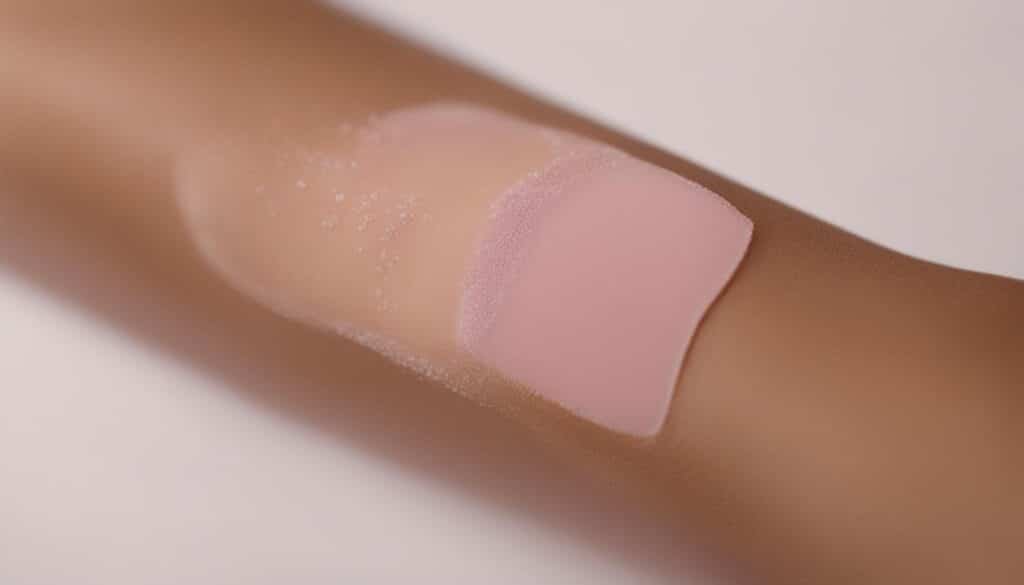Tips for Sensitive Skin : Taking care of sensitive skin requires special attention and a gentle approach. In this article, we will provide you with DIY skincare tips specifically tailored for sensitive skin. These tips will help you nurture, protect, and enhance your skin’s health and appearance, all while avoiding irritation and discomfort.
Key Takeaways:
- Choose gentle and non-irritating skincare products for sensitive skin.
- Establish a consistent daily skincare routine using mild cleansers, soothing toners, and lightweight moisturizers.
- Protect your skin from irritants by incorporating sunscreen, avoiding hand-to-face contact, and using lip balm with SPF.
- Select skincare products with natural ingredients, free from potential irritants, fragrance-free, hypoallergenic, and non-comedogenic.
- Adjust your skincare routine during harsh winter weather to combat dryness and protect your skin.
Understanding Sensitive Skin
Sensitive skin requires a delicate touch and tailored care to ensure its health and comfort. Identifying your skin type and understanding its specific needs is essential in creating an effective skincare routine. There are five main skin types: normal, sensitive, combination, dry, and oily. Each skin type presents unique characteristics and requirements. By recognizing your skin type, you can make informed decisions when choosing skincare products and developing a personalized skincare regimen.
Sensitive skin is particularly susceptible to certain ingredients and may experience symptoms such as burning, dryness, itching, or redness. It is important to be mindful of these sensitivities and select products that are gentle and non-irritating. Whether you have dry skin, oily skin, or other skin conditions, understanding your skin type will guide you in finding the most suitable skincare solutions.
“Sensitive skin requires a delicate touch and tailored care to ensure its health and comfort.”
| Skin Type | Characteristics | Care Guidelines |
|---|---|---|
| Normal Skin | Well-balanced with no excessive oiliness or dryness | Regular cleansing, moisturizing, and protection from the sun |
| Sensitive Skin | Prone to irritation and reactions | Use non-irritating and fragrance-free products, avoid harsh ingredients |
| Combination Skin | Oily in certain areas (such as the T-zone) and dry in others | Use products suitable for both oily and dry areas, balance hydration |
| Dry Skin | Lacks moisture and may appear flaky or rough | Moisturize regularly, use gentle cleansers, avoid harsh exfoliants |
| Oily Skin | Produces excess sebum, appears shiny or greasy | Cleanse thoroughly, use oil-free and mattifying products |
Daily Skincare Routine for Sensitive Skin
Establishing a consistent skincare routine is essential for maintaining healthy and radiant skin, especially if you have sensitive skin. The key to caring for your delicate skin is using gentle and non-irritating skincare products that provide effective results without compromising your skin’s health.
When it comes to cleansing, opt for a mild cleanser specifically designed for sensitive skin. Look for cleansers that are fragrance-free and formulated to remove impurities without stripping your skin of its natural moisture.
Toners can be a fantastic addition to your skincare routine as they help balance your skin care pH levels and provide additional hydration. Choose a soothing toner that contains gentle ingredients like chamomile or aloe vera, which can help calm and soothe sensitive skin.
Next, moisturize your skin with a lightweight, non-comedogenic moisturizer. Look for products that are specifically formulated for sensitive skin and offer hydration without clogging your pores. Ingredients such as hyaluronic acid and ceramides can help replenish and strengthen your skin’s natural barrier.
A consistent skincare routine for sensitive skin should also include using skincare products specifically formulated for your skin type. Avoid harsh ingredients such as alcohol, fragrances, and sulfates as they can cause irritation and redness.
Remember to always patch test new skincare products on a small area of skin before incorporating them into your routine. This will help you identify any potential reactions or sensitivities.
Recommended Daily Skincare Routine for Sensitive Skin
- Cleanser: Use a mild cleanser designed for sensitive skin to gently remove impurities without causing irritation.
- Toner: Apply a soothing toner to balance your skin’s pH levels and provide additional hydration.
- Moisturizer: Use a lightweight moisturizer formulated for sensitive skin to hydrate without clogging pores.
Avoid over-exfoliating your skin and limit your exposure to harsh environmental factors, such as excessive sun exposure and extreme temperatures. Protect your skin from the sun by wearing a broad-spectrum sunscreen with at least SPF 30 that is specifically formulated for sensitive skin.
By following a gentle and consistent skincare routine tailored to your sensitive skin, you can nourish and protect your skin, keeping it healthy, radiant, and free from irritation.
Protecting Your Skin from Irritation
When it comes to sensitive skin, protecting it from potential irritants is crucial to prevent flare-ups and discomfort. By incorporating a few simple practices into your skincare routine, you can help maintain the health and balance of your skin.
Sunscreen: Shielding Your Skin from Harmful UV Rays
One essential step in protecting sensitive skin is to always incorporate sunscreen into your daily routine. **Sunscreen** helps safeguard your skin from the damaging effects of **UV rays** and reduces the risk of premature aging. Look for a broad-spectrum sunscreen with a high SPF that is specifically formulated for sensitive skin. Apply it generously to all exposed areas of your body, including the face, neck, and hands.

Hand-to-Face Contact: Minimizing Bacteria Transfer
Avoiding unnecessary **hand-to-face contact** is another important practice for protecting sensitive skin. Your hands come into contact with various surfaces throughout the day, collecting dirt, bacteria, and oils. When you touch your face, these impurities can be transferred to your skin, potentially leading to breakouts and irritation. By consciously avoiding touching your face, you can minimize the risk of introducing these irritants to your sensitive skin.
Lip Balm: SPF Protection for Your Lips
Don’t forget to protect your lips from the sun’s harmful rays as well. **Lip balm** with SPF is an essential item to include in your skincare arsenal. Lips are prone to dryness and can sunburn easily, making them more susceptible to discomfort and chapping. By applying a lip balm with SPF throughout the day, you can keep your lips hydrated, protected, and healthy.
Gentle Care: Avoiding Harsh Products and Exfoliation
Practicing **gentle care** is crucial for sensitive skin. Avoid using harsh skincare products that contain potential irritants, such as fragrances or harsh chemicals. Opt for gentle, non-irritating formulations that are specifically designed for sensitive skin. Additionally, be mindful of the frequency and intensity of exfoliation. While exfoliating can help remove dead skin cells and reveal a brighter complexion, overdoing it can strip away the skin’s natural oils and disrupt its protective barrier. Stick to a gentle exfoliation routine and listen to your glowing skin’s needs.
Incorporating these skincare practices can help protect your sensitive skin from irritation, allowing it to remain healthy, nourished, and resilient.
Choosing Skincare Products for Sensitive Skin
When it comes to caring for sensitive skin, it’s crucial to select skincare products that prioritize gentle, non-irritating ingredients. Opting for products enriched with natural ingredients can be beneficial in nurturing your skin’s delicate needs. Look for formulations that are free from potential irritants such as fragrances, hypoallergenic, and non-comedogenic.
Using products with **natural ingredients** is particularly helpful for sensitive skin. These ingredients are often derived from plants or other organic sources, making them less likely to cause irritation or allergic reactions. Natural oils like jojoba oil can provide nourishment without overwhelming the skin. Hyaluronic acid, known for its ability to retain moisture, is another excellent choice for hydrating sensitive skin.
When shopping for skincare products, check the labels for **non-irritating** and **fragrance-free** formulations. Fragrances can be a common trigger for sensitivity, so opting for fragrance-free options reduces the risk of skin irritation. Additionally, **hypoallergenic** products are designed to minimize the chances of allergic reactions, making them suitable for sensitive skin.
Another factor to consider is whether the products are **non-comedogenic**. Non-comedogenic products are formulated to not clog pores, which is essential for sensitive skin prone to breakouts or acne. These products allow the skin to breathe and prevent the risk of pore blockage.
Reading Labels for Sensitive Skin
When selecting skincare products, it’s important to take the time to read the labels thoroughly. Look for specific keywords such as “sensitive skin,” “hypoallergenic,” and “dermatologist-tested” to ensure the product is suitable for your skin’s unique needs. This extra attention to detail can help you avoid ingredients that have been known to cause sensitivity or irritation in your skin.
“Choosing skincare products designed for sensitive skin can make a world of difference in achieving a healthy complexion without unnecessary irritation.” – Dr. Samantha Johnson, Dermatologist
Remember, everyone’s skin is different, and what works for one person may not work for another. Conducting a patch test before fully incorporating a new product into your routine is advisable. This involves applying a small amount of the product to a discreet area of your skin, such as behind your ear or on your inner arm, and observing how your skin reacts over the next 24-48 hours.
By being mindful of the ingredients, considering natural options, and prioritizing gentle formulations, you can choose skincare products that deliver the care and protection your sensitive skin deserves.

Winter Skincare Tips for Sensitive Skin
Winter weather can be particularly harsh on sensitive skin, leading to increased dryness and sensitivity. To combat these effects, it is important to adjust your skincare routine accordingly. Use moisturizers that provide deep hydration and nourishment to prevent dryness. Consider adding a protective layer to your skincare routine to lock in moisture and shield your skin from the elements. Protecting your skin with scarves and hats can also provide an extra layer of defense.

Protecting your skin from dryness and harsh weather is essential during the winter months. The cold temperatures and low humidity can strip your skin of its natural moisture, leaving it feeling tight and dehydrated. To combat this, focus on moisture-locking products and protective measures to keep your skin healthy and hydrated.
Deep Hydration with Moisturizers
Invest in moisturizers that are specifically formulated to combat dryness and provide intense hydration. Look for ingredients like **hyaluronic acid** and **ceramides**, which can deeply nourish and replenish your skin’s moisture barrier. Applying a moisturizer twice a day, in the morning and at night, can help keep your skin hydrated and protected against the harsh winter weather.
Add a Protective Layer
Consider incorporating a protective layer into your skincare routine to shield your skin from the elements. **Emollient-rich creams** or **oils** that create a barrier on the skin’s surface can help lock in moisture and prevent moisture loss. Apply this protective layer on top of your regular moisturizer and focus on areas that are more prone to dryness, such as the cheeks and lips.
Protective Accessories
Don’t underestimate the power of accessories in protecting your skin during the winter months. Wearing a **scarf** wrapped around your face and neck can shield your skin from cold winds and low temperatures. Additionally, wearing a hat can provide an extra layer of protection. Opt for hats made of **soft fabrics**, like cashmere or fleece, that won’t further irritate your skin.
The key to winter skincare for sensitive skin lies in **moisture-locking** and **protection**. By incorporating these tips into your routine, you can maintain a healthy and hydrated complexion, even in the face of harsh winter weather.
Ingredients to Look for in Skincare Products for Sensitive Skin
Certain ingredients are known for their calming and soothing properties, making them ideal for sensitive skin. When choosing skincare products, it’s important to look for ingredients that provide optimal care and help maintain the health of your sensitive skin.
Hyaluronic Acid
Hyaluronic acid is a powerful humectant that attracts and retains moisture in the skin, resulting in hydration and plumpness. It helps replenish moisture levels, reducing dryness and improving the overall appearance of sensitive skin.
Jojoba Oil
Jojoba oil is a lightweight and non-greasy oil that closely resembles the skin’s natural sebum. It is rich in vitamins and fatty acids, providing deep nourishment and moisturization without clogging pores or causing irritation. Jojoba oil creates a protective barrier that locks in moisture, keeping sensitive skin hydrated and supple.
Ceramides
Ceramides are naturally occurring lipids in the skin that help maintain the skin barrier function. It strengthens and protects the skin, preventing moisture loss and reducing sensitivity. By replenishing ceramides in skincare products, you can support the integrity of your skin barrier and promote a healthier skin barrier.
Squalane
Squalane is a lightweight oil derived from plants, including olives. It has excellent emollient properties, providing intense hydration and soothing the skin. Squalane is easily absorbed and can help calm inflammation, reduce redness, and improve the overall texture of sensitive skin.
Chamomile
Chamomile is a natural ingredient with anti-inflammatory properties, making it beneficial for sensitive skin. It helps soothe irritation, reduce redness, and promote a calm and balanced complexion. Chamomile extract or oil can be found in various skincare products, such as cleansers, toners, and serums.
When shopping for skincare products for your sensitive skin, look for these key ingredients to ensure optimal care and protection. Incorporating products that contain hyaluronic acid, jojoba oil, ceramides, squalane, and chamomile can help provide the soothing and nourishing properties your sensitive skin needs.

Patch Testing and Personalized Skincare
Before introducing new skincare products into your routine, it is essential to perform a **patch test** on a small area of your skin. This test allows you to check for any potential reactions and identify if the product is suitable for your sensitive skin.
For those with sensitive skin, this step is crucial in preventing irritation, redness, or discomfort that may arise from using inappropriate products. A patch test involves applying a small amount of the product to a discreet area, such as the inner arm or behind the ear, and waiting for 24-48 hours to observe any adverse reactions. If no signs of irritation occur, it is generally considered safe to use the product on your face or body.
In addition to patch testing, seeking **personalized guidance** from **skincare experts** can provide you with tailored solutions that cater to your skin’s specific needs. Skincare experts, such as dermatologists or estheticians, have in-depth knowledge about different skin types and can offer professional advice to help you choose the best skincare products and routines for your sensitive skin.

Personalized guidance can help you navigate through the overwhelming world of skincare and ensure that you make informed decisions regarding the products you use. Skincare experts can analyze your skin, discuss any concerns or conditions you may have, and recommend suitable products and treatments that address your specific skincare needs.
Skincare experts provide invaluable insights and expertise that can save you from potential skincare disasters. By working with them, you can receive personalized recommendations and advice that are tailored to your sensitive skin, helping you achieve optimal results.
Remember, patch testing and personalized guidance are vital components of creating a skincare routine that is both effective and safe for your sensitive skin. By taking these precautions, you can minimize the risk of adverse reactions and ensure that your skincare journey is one of care, comfort, and confidence.
Conclusion
Taking care of sensitive skin requires a gentle touch and a personalized approach. By following the tips and recommendations provided in this article, you can give your sensitive skin the tender loving care it deserves. Remember to choose skincare products formulated for sensitive skin, incorporate gentle and non-irritating ingredients, and establish a consistent skincare routine. With the right care and attention, you can maintain healthy and radiant skin, free from irritation and discomfort.
Also Read : The Ultimate Guide to Achieving a Luminous Glow: Skin Brightening Skincare Secrets
FAQ
What is sensitive skin?
Sensitive skin is characterized by its vulnerability to certain ingredients and may exhibit symptoms such as burning, dryness, itching, or redness.
How do I know my skin type?
There are five main skin types: normal, sensitive, combination, dry, and oily. Knowing your skin type will help you make informed decisions when choosing skincare products and routines.
What is a daily skincare routine for sensitive skin?
A daily skincare routine for sensitive skin should include a gentle cleanser, a soothing toner, and a lightweight moisturizer specifically formulated for sensitive skin.
How can I protect my sensitive skin from irritation?
To protect sensitive skin from irritation, incorporate sunscreen into your daily skincare routine, avoid touching your face with your hands, and use a lip balm with SPF to protect your lips from sun damage.
What should I look for when choosing skincare products for sensitive skin?
When choosing skincare products for sensitive skin, look for those that contain natural ingredients, are non-irritating, fragrance-free, hypoallergenic, and non-comedogenic.
How can I take care of my sensitive skin during the winter?
During the winter, protect your sensitive skin from dryness and the harsh weather by using moisturizers that provide deep hydration, adding a protective layer to your skincare routine, and protecting your skin with scarves and hats.
What ingredients should I look for in skincare products for sensitive skin?
Look for skincare products that contain hyaluronic acid for hydration, jojoba oil for nourishment, ceramides to strengthen the skin barrier, squalane for softening and calming, and chamomile for reducing redness and irritation.
How should I patch test new skincare products for sensitive skin?
Before introducing new skincare products, perform a patch test on a small area of your skin to check for any potential reactions, especially for those with sensitive skin.
Should I seek personalized guidance for my sensitive skin?
Yes, seeking personalized guidance from skincare experts can provide you with tailored solutions and help you choose the best skincare products and routines for your sensitive skin.
Source Links
- https://alamoheightsderm.com/tender-love-and-skincare/
- https://timesofindia.indiatimes.com/life-style/beauty/winter-skincare-ritual-your-ultimate-step-by-step-guide-for-sensitive-skin/articleshow/106100083.cms
- https://www.fresh.com/us/stories/skincare-education/article-best-ingredients-for-sensitive-skin.html




